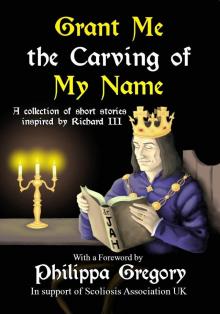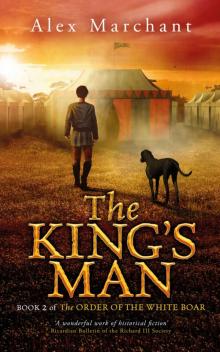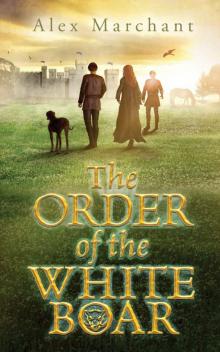- Home
- Alex Marchant
Grant Me the Carving of My Name: An anthology of short fiction inspired by King Richard III
Grant Me the Carving of My Name: An anthology of short fiction inspired by King Richard III Read online
Grant Me the Carving of
My Name
Grant Me the Carving of
My Name
An anthology of short fiction inspired by King Richard III
With a foreword by
Philippa Gregory
Edited by
Alex Marchant
Sold in support of Scoliosis Association UK
First published 2018 by Marchant Ventures
Copyright © 2018 the contributors
Editorial selection and introduction copyright © 2018 Alex Marchant
Further copies can be ordered from Alex at
[email protected]
The right of the contributors to be identified as the authors of this work has been asserted in accordance with the Copyright, Design and Patents Act, 1988.
All rights reserved. No part of this publications may be reproduced, stored in or introduced to a retrieval system, or transmitted, in any form or by any means, electronic, mechanical, photocopying, recording or otherwise, without the prior permission of the copyright holder.
ISBN: 9781730715693
Cover illustration: © 2018 Riikka Katajisto
To
Dr John Ashdown-Hill
For his tireless dedication to scholarship and the Ricardian cause
CONTENTS
Contents
Foreword
Introduction
Purgatory
Long Live the King
Five White Stones
Dame Joanne's Talke Thinge
Ave Atque Vale
Buckingham’s End
Abduction
The Beast of Middleham Moor
Joanna Dreams
14th April 1471 – Blooding
Easter 1483
Myth and Man
Kindred Spirits: Return of the King
Beyond the Rood
Contents
Foreword by Philippa Gregory
Acknowledgements
Introduction
Purgatory Marla Skidmore
Long Live the King Narrelle M. Harris
Five White Stones J. P. Reedman
Dames Joanne’s Talke Thinge Larner and Lamb
Bowyer Tower Wendy Johnson
Ave Atque Vale Frances Quinn
Buckingham’s End Richard Unwin
Abduction Joanne R. Larner
The Beast of Middleham Moor Alex Marchant
Joanna Dreams Máire Martello
14th April 1471 – Blooding Matthew Lewis
Easter 1483 Alex Marchant
Myth and Man Narrelle M. Harris
Kindred Spirits: Return of the King Jennifer C. Wilson
Beyond the Rood Wendy Johnson
FOREWORD
Philippa Gregory
This collection has come about – as so many good things do – from a dream and a joke. Authors Alex Marchant and Wendy Johnson exchanged short stories about Richard III and joked that they should make a collection of stories about England’s most controversial king. Editor Alex Marchant spoke to other authors and the dream of a book of short fiction looking at aspects of Richard – real and imagined – turned into reality: this book, published in support of Scoliosis Association UK (SAUK).
Richard’s history has been obscured by Tudor propaganda, by no less an author than William Shakespeare, and by the mysteries that still surround this king. With the charm of the Plantagenet family and all of their determined ambition, the youngest son to Richard of York was never going live an ordinary life.
He was a boy when his father made his first attempt on the throne of England and he grew up as his older brother’s most trusted commander. But with the energy that helped him overcome the physical difficulties of serving as a knight in armour with scoliosis of the spine, the religious conviction that guided him, the passion that led him to his first runaway marriage and the intense desire to succeed, Richard led an extraordinary life.
Even his death was exceptional – and misremembered. He was the last English king to lead a cavalry charge in battle, and the last to die in battle. He died defending his throne, as a crowned king of England against a rival who was – at the time – a usurper without royal rights. His death is woefully recorded: the Shakespeare play has Richard calling for a horse to ride into his last charge: ‘A horse! A horse! My kingdom for a horse!’, so often quoted as a coward calling for the means to escape. In fact, his last words were ‘Treason! Treason! Treason!’, as he went down under the blows of former friends and allies.
It’s a more dramatic end; it’s a more tragic end. Can there be any doubt that Shakespeare did not use it because it casts such doubt on the claimant to the throne and his supporters – Shakespeare’s new patrons, the Tudors?
Richard’s burial and the subsequent rediscovery of the lost grave is another unexpected event in his story. At last this most troubled king can rest in peace, and this anthology is one of the many tributes that have been paid to him.
Yorkshire
October 2018
Acknowledgements
We would like to thank all the contributors for generously donating their work to this anthology, including Poet Laureate Carol Ann Duffy for allowing us to use a line from her poem ‘Richard’ for our title, Riikka Katajisto for her fantastic image of King Richard, Dan Rendell for designing the cover around it, and of course Philippa Gregory for kindly providing a Foreword.
Some of the pieces have been previously published in some form and we would like to acknowledge permission to reproduce them here.
‘Purgatory’ was originally published as Chapter 6 of Renaissance: The Fall and Rise of a King by Marla Skidmore.
‘Long Live the King’ was originally published in Scar Tissues and Other Stories by Narrelle M. Harris.
‘Bowyer Tower’ and ‘Beyond the Rood’ were originally published in The Court Journal: the Magazine of the Scottish Branch of the Richard III Society.
‘Buckingham’s End’ was originally published in A Wilderness of Sea by Richard Unwin.
‘14th April 1481 – Blooding’ was originally published as Chapter 2 of Loyalty by Matthew Lewis.
‘Easter 1483’ was originally published in The Order of the White Boar by Alex Marchant.
About the illustrator
Riikka Katajisto knew quite early what she wanted to be when she grew up, having felt a strong desire to express herself in an artistic way as soon as she learned how to walk. She went straight to Kokkola's Nordicartschool after high school to learn different art techniques and then to Kankaanpää Artschool to perfect her artistic and creative expression, there developing her own inimitable style.
From childhood Riikka has been inspired by history, particularly the mysterious twilight wanderings of medieval times, and King Richard III especially has been an inexhaustible theme – sometimes with an artist’s freedom to stretch the truth of events in his life. Her art is aimed at history lovers who don’t take things too seriously – she often tosses humour into her pictures to make them laugh. She has published two children's books, Plantagenet and Herman the Dreammosum, and made many short films using a variety of movie-making tools.
Website: https://riikkanikko.blogspot.com/
Blurb:http://www.blurb.com/books/4496331-plantagenet
http://www.blurb.com/books/3582284-herman-the-dreammosum
Introduction
/> In early 2016 I had a dream – quite literally. One of those between-sleep-and-waking dreams. A vivid image. Of a frightened boy caught in a snowstorm, with a strong hand outstretched, reaching towards him. I recognized it was on a moor, had a powerful feeling that moor was up above Wensleydale, just a few miles from where I live. And I thought I knew who that strong hand belonged to.
The imagination is a funny thing. I got up, showered, had breakfast, walked the dog – went about my daily routine. And within a couple of hours a story which became ‘The Beast of Middleham Moor’ was almost complete in my head. And of course I was right about whose hand it was.
At risk of spoilers, I’ll not name the person. But suffice to say, he was a major character in the two books for children I’d recently finished writing – and I think I ‘missed’ him.
As an author, when one has spent, perhaps, two or three years in the company of certain characters – whether fictional, or real, historical and dramatized – I suspect it’s not unusual to miss them once you’ve finished telling their story. In my case I missed some so much I’ve started writing a third book of tales of their lives. Some, of course, will not reappear for various reasons, which may not be within an author’s control if they were real people, with real lives, and real outcomes – not always good outcomes. Perhaps that sense of missing – or even ‘loss’ – was what prompted my fragmentary dream.
I’m not alone in feeling drawn to my own characters – and this book is a testament to that. A single character this time, one a dozen authors (as well as the distinguished writer of our Foreword) have been moved to give life to in various ways. A historical character, of course. And so a real living person at his own point in time. And one who holds a fascination for many people – a fascination that seems strange to some others, although perhaps less so since the momentous rediscovery of his centuries-lost grave in 2012. And I’m not the only person – fiction writer or otherwise – who has had similar experiences leading to a creative impulse.
And here are some of the fruits of those impulses – a collection of short stories inspired by that man. In my case I soon knew the main protagonist of my story – the boy, lost – would have scoliosis, and once the story was completed, I knew it could be a potential fundraiser for the worthy cause of the Scoliosis Association UK (SAUK), which helps support people with the condition and their families. This is a charity that no doubt would have been close to the heart of the man who prompted all these stories, whose own scoliosis only became widely known following the excavation of his grave.
This man was, of course, maligned in the decades after his death by writers living under the king who stole his throne: a little over a century later his good reputation – which led the city council of York to call him ‘the most famous prince of blessed memory – was in tatters thanks to a damning depiction by perhaps the world’s greatest playwright – writing his plays for the granddaughter of that same king. This anthology is one of many works that seek to bring the real man back into focus – the man about whom the Scottish ambassador of the time said, ‘nature never enclosed within a smaller frame so great a mind or such remarkable powers’.
I’m delighted that one of the Looking for Richard Project team responsible for finding his grave, Wendy Johnson, herself also a writer of fiction in addition to her historical research, has contributed two pieces to this anthology and been instrumental in persuading me to bring all these stories together. Perhaps it’s unsurprising that, having worked so closely on such a project, she has been inspired to write about the man concerned.
Other moments of inspiration involved a bouquet of white roses seen at the foot of a statue, a chance remark about bringing a medieval man to the present day, and the real-life dream of a young woman who lived five centuries ago and gave her heart to a man she never met. Perhaps you yourself have had similar moments. If so, maybe you would like the chance to share them. At the end of the book is a call for contributions to a possible future anthology. In the meantime, I hope that you enjoy this one!
This book is dedicated to one of the inspirational people whose painstaking work over a number of years led to the finding of the grave that ultimately prompted this book: Dr John Ashdown-Hill, who sadly died earlier this year – a great loss to scholarship, especially of the late fifteenth century, and of King Richard III in particular.
Alex Marchant
October 2018
Purgatory
Marla Skidmore
An adapted excerpt from Renaissance: Fall and Rise of a King
After his death in battle on Redemore Plain, King Richard III discovers his soul must, like every other, be guided through the spiritual trials of Purgatory by a celestial mentor. Yet when they reach Eden, the last stage before the ascent to heaven, Richard’s spiritual guide, Franciscan monk Father Gilbert, finds his young charge strangely reluctant to take the final step …
Richard’s hand hovered over the bishop.
‘Should I move him?’ he mused aloud.
Seeing his friend’s gaze swing towards his queen, the monk smirked inwardly, knowing exactly what he would do. Richard was quite unaware of his obsession with the queen. Whenever they played chess he would advance her and then manoeuvre her all around the chessboard, instead of utilizing his pawns, knights and rooks. He watched Richard slide her forward and with humorous exasperation reflected that, despite spending countless hours attempting to teach him the finer points of the game, Richard continued to be a truly terrible chess player. Instead of using that cool assessing brain to strategize, he allowed emotion to rule his moves.
This approach was totally out of character for the man the monk had come to know so well – the scholarly thinker and leader of men, who had been England’s last warrior king. Having been Richard’s guide and counsellor whilst he worked through his penance to satisfy the justice of heaven for his transgressions, Father Gilbert felt he had come to understand him well, but there were facets of his character that still remained an enigma. Richard’s journey to redemption had long been completed. Yet he was reluctant to take the final step into the next world. Something held him back. It was time to get to the bottom of his determination to stay here. The Guardians were becoming impatient.
‘My friend, for my own selfish reasons I would delay your departure for as long as possible and will be deeply saddened when you leave, but you must see that you cannot remain here indefinitely.’
Richard raised his head and looked inquiringly at the monk, a hint of amusement lurking behind his deep-set blue eyes.
‘Why ever not? I am comfortable here ... I lack nothing.’ He let his gaze range around the vast library that they were sitting in. ‘These shelves contain a copy of every book and manuscript ever written.’ I have been humbled and honoured to have been allowed to debate with and listen to the thoughts of some of humanity’s greatest and most wise souls ...’ He couldn’t suppress a chuckle. ‘And been amused by the cogitations of the most foolish ... Rest assured, monk, I am content,’ he murmured and, with a half-smile, slid his knight into Father Gilbert’s trap.
The monk huffed in silent irritation, but didn’t immediately pounce. It would be more instructive if Richard had time to perceive his error before he made his move. Father Gilbert sometimes wondered whether his protégé deliberately played badly just to bait him. Nevertheless, he was determined that Richard should become at least competent at chess before their ways finally parted.
‘Be that as it may, but your period of atonement was completed countless decades of mortal time ago,’ he pointed out dryly. ‘No other soul has lingered so long here in heaven’s ante-room …’
And there it was, that flicker of resistance behind Richard’s eyes.
The monk decided to confront head on his charge’s disinclination to leave Purgatory.
‘You have been tested, undergone correction and cleansed your soul of every residue of sin. Why are you so reluctant to embrace your heavenly destiny?’ he demanded.
Pushi
ng up from the deep leather armchair in which he sat, Richard strolled down the length of the book-lined room towards the tall mullioned windows that dominated one end. His lean figure was delineated by bright spring sunlight as he stood motionless, gazing reflectively out over the lush fertile valley that spread out below him. A tiny movement in the muscles at the corner of his mouth was the only outward sign of the troubled thoughts that plagued him. Sighing, he turned towards his mentor with a quizzical look.
‘And what exactly is my heavenly destiny, Gilbert? What will I experience for all eternity when I leave Eden?’
The monk moved a pawn and looked up with a benign smile.
‘Why, Richard ... you already know what is waiting for you ... absolute peace ... perfect happiness.’
Hearing the confidence in the monk’s words, Richard briefly closed his eyes.
Peace … happiness ... for him … how could that be...?
He swung round and slowly retraced his steps down the length of the room. Lowering himself back into his chair, he studied the state of play on the chessboard; his knight was doomed and he suspected that his bishop would go next. With a mental shrug he accepted the loss of his knight and sent his queen to waylay the monk’s bishop. Having made his move, he sat deep in thought for long moments, then clearing his throat, he turned determinedly towards the man with whom he had developed a bond closer than friendship, closer than family.
‘You told me long ago, that once it had been made ready, each soul would know when the time was right for it to ascend into the Afterlife.’
Alerted by the edgy tension in Richard’s voice, Father Gilbert abandoned the game. Reclining against the worn leather back of his chair, he folded powerful arms across his deep chest. Stretching out his legs, he crossed one ankle over the other and raised his sharp eyes to Richard’s face.

 Grant Me the Carving of My Name: An anthology of short fiction inspired by King Richard III
Grant Me the Carving of My Name: An anthology of short fiction inspired by King Richard III The King's Man (The Order of the White Boar Book 2)
The King's Man (The Order of the White Boar Book 2) The Order of the White Boar
The Order of the White Boar